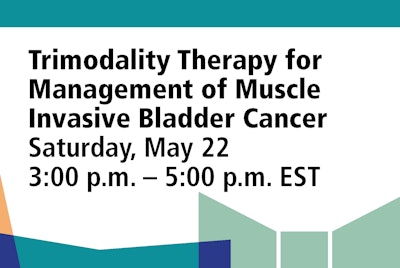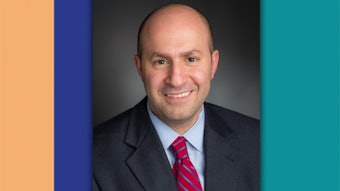Bladder Sparing treatment approach gains attention
The goal of trimodality therapy is optimum cancer control.

A lesser known approach to combat bladder cancer can yield a positive outcome. This trimodality, multidisciplinary bladder sparing approach includes aggressive surgical resection, followed by chemotherapy and radiation therapy, as well as repeat cystoscopic surveillance. More importantly, in the right patients, it results in the equivalent outcome of a radical cystectomy.
Trimodality therapy is the focus of Saturday’s session, “Trimodality Therapy for Management of Muscle Invasive Bladder Cancer.” Adam Feldman, MD, MPH, will lead the discussion with a look at the importance of timing, collaboration among clinicians and identifying the ideal candidate. Dr. Feldman is an assistant professor of surgery at Harvard Medical School and urological oncologist at the Massachusetts General Hospital in Boston.
“This is a treatment option with the goal of optimum cancer control. It is absolutely a curative option,” Dr. Feldman said. “Some urologists do not have experience with the nuances of this approach and the importance of engaging a team of urological surgeons, radiation oncologists and medical oncologists.”
During the session, Dr. Feldman will underscore an important first step of trimodality therapy—an aggressive, initial transurethral resection to remove the tumor and spare the bladder. However, the urologist’s role does not end there. Following chemotherapy and radiation, a repeat transurethral resection and ongoing cystoscopic bladder surveillance are critical to the patient’s ongoing management of muscle invasive bladder cancer.
Next, Dr. Feldman said, it is critical for urologists to coordinate multidisciplinary efforts for bladder preservation with radiation fields and concurrent chemotherapy.
“It is critical, from the urological surgeon’s point of view, to create a good working relationship with the radiation oncologist and medical oncologist,” Dr. Feldman said. “A multidisciplinary approach is paramount to the critical timing that has to occur in sparing the bladder and achieving the desired outcome.”
Identifying which patients are candidates for trimodality bladder-sparing therapy and which patients are not is an equally important role, according to Dr. Feldman. Those who are considered ideal candidates include patients whose tumor can be localized and maximally resected through the cystoscope. Patients preferably should be free of hydronephrosis, extensive carcinoma in situ and must not have ureteral tumors or evidence of metastatic disease. Patients also should not have poor bladder function, a history of inflammatory bowel disease or prior pelvic radiation. Patients who are not good candidates should instead undergo radical cystectomy.
“The goal is to offer patients another option of treating bladder cancer other than radical surgery with the removal of the bladder,” Dr. Feldman said.
Saturday’s session also will review potential toxicities and quality of life associated with bladder sparing therapy versus cystectomy, address emerging topics, such as novel biomarkers and the potential role of combining chemoradiation with immunotherapy, and discuss prospective randomized trials and large institutional experiences with trimodality therapy for muscle invasive bladder cancer.
Visit AUA2021 Daily News Online for more articles.











